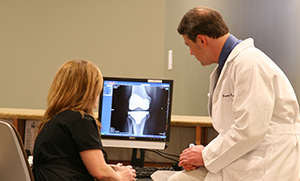Getting Ready For Surgery
Joint replacement surgery requires several steps to be taken prior to surgery day.
2-4 Weeks Before Surgery – Preoperative Appointments
There are three preoperative appointments before your surgery.
Appointment 1: Pre-Testing Appointment
We will schedule you for your Pre-Testing Appointment at the Admission and Testing Center. It is located in Medical Office Building One, Entrance A. Here’s what to expect:
- Medical Exam – At your Pre-Testing appointment, a nurse will take your health history and medication list, and a physician or nurse practitioner will perform a medical exam and order any tests that need to be completed at least 14 days before surgery. This may include blood test, X-rays, an EKG, urine sample and nasal swab. These are non-fasting tests, so please eat and take your morning medications as scheduled.
-
Things to Bring to Your Pre-Testing Appointment
- Medications – We’ll need to know about all the medications you are taking, including prescriptions, over-the- counter medications, vitamins, and herbal supplements. We’ll review your medications and tell you which ones you should stop taking and when. Please remember: It is very important to continue to take all of your prescribed medications until your physician or we instruct you to stop them. Please bring all your medications and their bottles to your Pre-Testing appointment.
- Insurance Cards
- Advance Directive and/or Power of Attorney papers, if applicable
Appointment 2: Joint Replacement Educational Class
You and your Joint Coach will attend a class at Memorial Hospital Belleville in the Orthopedic and Neurosciences Center. The class will provide you with information about your surgery and give you a chance to ask questions. We will cover what to expect before, during, and after surgery. The class will be taught by a nurse from The Joint Replacement Center. We’ll talk about how to prepare for your surgery, your hosptial stay and taking care of yourself after you go home.
Appointment 3: Pre-Surgery Therapy Screening
To help us create the best plan to speed up your recovery, your physical therapy team will also screen you at the one of three Memorial outpatient therapy clinics. Your screening will include:
- Identifying your equipment needs after your Joint Replacement Center stay
- Information about the therapy you will receive during and after your Joint Replacement Center stay to ensure the best outcome from your surgery
- Plus, we’ll design an exercise program to help ensure your muscles are as strong as they can be after surgery. Your therapist will show you how to do each exercise, make sure you’re doing each properly and give you written instructions with diagrams
1 Week Before Surgery
Taking responsibility for your health means asking the right questions. Now’s the time to ask yourself:
-
Do You Have an Infection? Notify your surgeon’s office right away if you think you might have an infection of any kind, such as:
- Bladder infection
- Skin infection
- Tooth infection
- Respiratory infection
- Is Everything Ready for Your Surgery? Follow-up with your surgeon’s office and make sure everything is ready for surgery, including that your test results have been reviewed by your physicians and all paperwork is completed.
-
Complete the “Prepare Your Home” Checklist
- Clean your home and do the laundry.
- Put frequently used items on easy-to-reach shelves, drawers or countertops.
- Arrange for someone to collect your mail, take care of your pets and your yard work.
- For your own safety, make sure you have a secure handrail on at least one side of inside and outside steps.
-
Unclutter Passageways at Home
- Make sure all pathways are clear of clutter and wide enough so you can move around easily with your walker.
- Pick up throw rugs and tack down loose carpeting. Cover slippery surfaces with carpets that are firmly anchored to the floor or that have nonskid backs.
- Be aware of things that might cause you to slip or trip, such as pets, small objects or uneven surfaces.
- Keep electrical extensions and phone cords out of your way. But, don’t run wires under rugs, because that’s a fire hazard.
-
Have Good Lighting
- Have good lighting throughout your home. If you haven’t already, consider installing nightlights in the bathroom, bedroom and hallways.
-
Other Suggestions for Home
- Have at least one sturdy chair with armrests.
A Few Days Before Surgery
-
Pack properly for the hospital
-
To make your stay at the Joint Replacement Center as easy and home-like as possible, please bring the following:
- A positive, can-do attitude and commitment to your fast recovery!
- Important telephone numbers (joint coach, family, friends, etc.).
- The Joint Replacement Center Patient Guide.
- We will provide hospital gowns, but if you would be more comfortable, bring two to three outfits to wear during your Joint Replacement Center stay. Bring loose-fitting clothing (T-shirts, drawstring or elastic band shorts or loose pants). Remember that you’ll be walking in the halls, so plan for modesty. If desired, you can also bring a robe or housecoat.
- Comfortable, sturdy shoes and socks. No flip-flops, sandals, or open houseshoes, please. We provide non-skid socks while you are in the hospital, but you may bring your own socks if you would like.
- If you have been diagnosed with obstructive sleep apnea, please bring your personal CPAP machine.
- Your TENS unit if your surgeon has prescribed one for your hospital stay.
-
Please leave at home:
- Jewelry.
- Credit cards, checks, large amounts of cash.
- Medications — we’ll provide all of your medications while you’re here.
-
To make your stay at the Joint Replacement Center as easy and home-like as possible, please bring the following:
- Follow any special instructions you received from your Admission and Testing Center visit or your surgeon’s office.
Night Before Surgery
- Don’t eat anything after midnight, and drink clear liquids as instructed by your physician or anesthesiologist.
- Remove all nail polish from your fingernails.
- Don’t shave at or near the area where you will be having surgery.
- You will need to shower with antibacterial soap the night before surgery, then wait 2 hours. Next, use the special wipes provided by our Admission and Testing Center to prevent infection.
- Sleep on clean sheets with clean pajamas the night before surgery, and don’t let pets into the bed.
- Don’t use any lotions or powders after your baths.

Physicians at The Joint Replacement Center
Dr. Kevin Baumer
Dr. Steven Horner
Dr. Michael Hughes
Dr. Donald Johnston
Dr. Charles Lehmann
Dr. Gregory Simmons
To make an appointment with one of these orthopedic surgeons, simply call (618) 767-7000.

